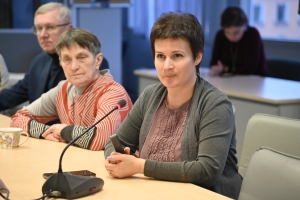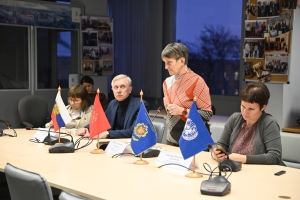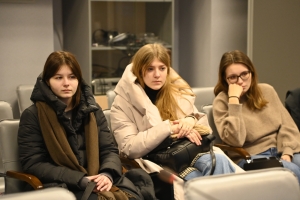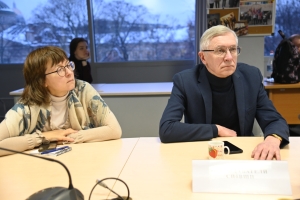On 15 February SCIT held an All Welcome Day. Everyone interested in joining the school had an opportunity to meet with teachers and graduates to learn about the educational process, the details of the admission procedure and the prospects for professional development. The event was held in a mixed format, some of the listeners joined it online.
Angelika Antonova, SCIT Deputy director, told about the history of the St. Petersburg School of Conference Interpreting and Translation : “SCIT was founded in 2008 following the initiative of the Russian Ministry of Foreign Affairs, which we are very proud of. The SCIT teaching staff was formed from T&I practitioners with a good reputation, so the ministry believed in us and supported us, and the UN signed a Memorandum of Understanding with us. Over the 15 years of the school’s existence, we turned out 171 graduates. It may not sound as much, but we prioritize quality. We are proud of our graduates and have confidence in their skill.”
UN professional experts joined the event: Inga Khramkova, interpreter at RIS, UNHQ in New York, and Kirill Kasyanov, Head of the Russian Interpretation Section at UNON. Inga Khramkova, UN coordinator for MoU, is herself a SCIT graduate and she was the first graduate to work as a simultaneous interpreter at the UN General Assembly and the Security Council. She had a lot to tell about the work of a UN interpreter and give practical advice on preparation for the SCIT aptitude tests. Kirill Kasyanov, who has been giving master classes in interpretation to SCIT students for many years and has more than once supervised SCIT interns at UNON, spoke about the importance of the Russian language for interpreters, which should be flexible and terminological at the same time. Experienced translators wished all applicants good luck in the aptitude tests!
Director Irina Alekseeva spoke in detail about the educational process and aptitude tests. “The main place in the training process is given to practical classes, since we train primarily for the UN. Of the six UN languages, we have all except Arabic, but we have German instead, because we also train our students to work in the Russian market and try hard to keep up the professional standards. For the whole year, our students learn simultaneous interpretation, as well as consecutive interpretation and written translation. The most popular program we offer is Conference Interpreting and Translation, where two thirds of the classes are devoted to developing interpretation skills,” she noted.
Irina Alexeeva described the aptitude tests in detail, telling what skills applicants need to demonstrate and what mistakes they should try to avoid. She stressed that SCIT applicants should not only be fluent in two foreign languages, but also be able to express their thoughts competently in Russian, since good knowledge of their native language is no less important for an interpreter. She also added that most SCIT students are people who have been working as translators for several years and want to upgrade their skills, but recent university graduates are also welcome.
This year’s students talked about the training process at the school and about the recently completed internship in Vienna.
At the end of the meeting, the audience was invited to ask questions.







 Русский
Русский